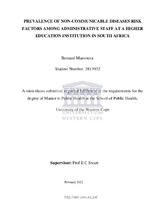| dc.contributor.advisor | Swart, Rina | |
| dc.contributor.author | Masvosva, Bernard | |
| dc.date.accessioned | 2022-03-01T08:33:46Z | |
| dc.date.available | 2022-03-01T08:33:46Z | |
| dc.date.issued | 2021 | |
| dc.identifier.uri | http://hdl.handle.net/11394/8765 | |
| dc.description | Magister Public Health - MPH | en_US |
| dc.description.abstract | Non-communicable diseases (NCD) continue to rise globally, causing significant morbidity and mortality. Low and medium-income countries (LMIC) such as South Africa are the worst affected because of an existing burden of infectious diseases and general poverty in the population. In South Africa, NCDs were responsible for 57.8% of total deaths in 2017, surpassing group 1 diseases (30.7%) that include tuberculosis and HIV/AIDS. Studies have shown that early detection of NCDs and interventions to reduce NCDs' risk significantly prevent suffering and further loss of lives. Workplace health promotion and healthy university concepts are widely being implemented globally to promote health at workplaces and institutions of higher learning. The study aimed to determine the prevalence of selected non-communicable disease risk factors and to assess the risk of cardiovascular disease among administrative staff at the University of the Western Cape (UWC), South Africa, using secondary data collected in 2011. | en_US |
| dc.language.iso | en | en_US |
| dc.publisher | University of Western Cape | en_US |
| dc.subject | Non-communicable diseases | en_US |
| dc.subject | Cardiovascular disease | en_US |
| dc.subject | Health promotion | en_US |
| dc.subject | Higher education | en_US |
| dc.subject | South Africa | en_US |
| dc.title | Prevalence of non-communicable diseases risk factors among administrative staff at a higher education institution in South Africa | en_US |
| dc.rights.holder | University of Western Cape | en_US |

